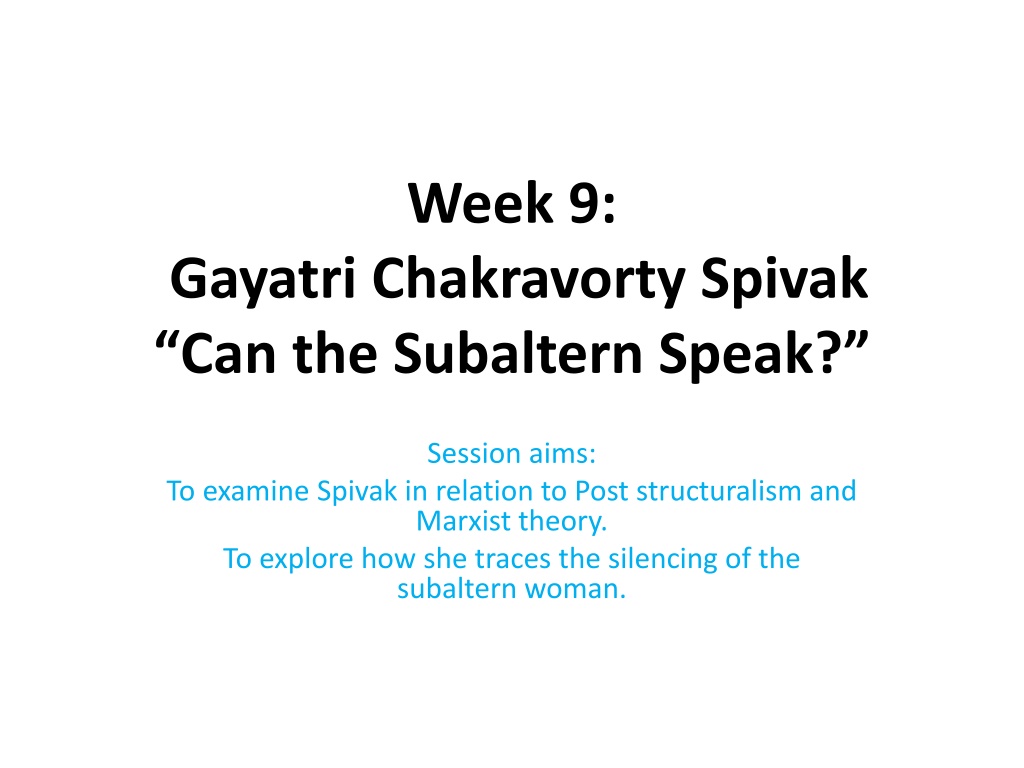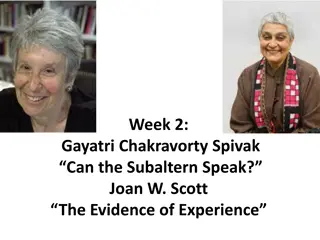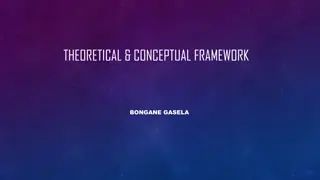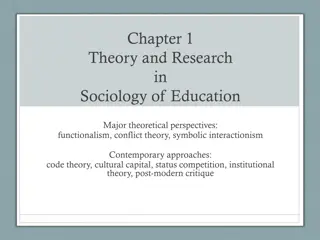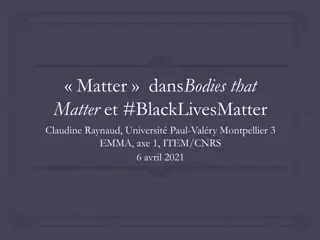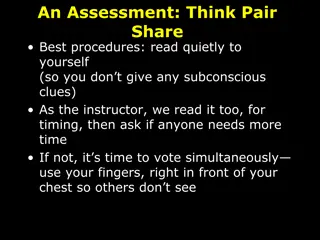Reimagining Theoretical Boundaries: Spivak's Critical Perspectives
Gayatri Chakravorty Spivak challenges traditional categories by constantly revising her critical theories in response to societal changes. She explores the silencing of subaltern women, drawing on post-structuralist and Marxist ideas to question Western imperialism. Spivak's work reflects a dynamic approach to philosophy, resisting easy categorization in postcolonial, feminist, or Marxist terms.
Download Presentation

Please find below an Image/Link to download the presentation.
The content on the website is provided AS IS for your information and personal use only. It may not be sold, licensed, or shared on other websites without obtaining consent from the author. Download presentation by click this link. If you encounter any issues during the download, it is possible that the publisher has removed the file from their server.
E N D
Presentation Transcript
Week 9: Gayatri Chakravorty Spivak Can the Subaltern Speak? Session aims: To examine Spivak in relation to Post structuralism and Marxist theory. To explore how she traces the silencing of the subaltern woman.
Beyond Postcolonialism Spivak is considered a leading postcolonial critic but her critical work is difficult to define because Spivak constantly revises her arguments to refuse identification by any single category or label such as postcolonial , feminist or Marxist . She is committed to re-thinking and revising theoretical concepts and approaches in response to social, economic and political changes in the contemporary world order. She embodies what it means to be a philosopher, because there s always new interpretations and new modes of reviving/revising schools of thought.
Deconstruction Spivak has often been criticised for drawing on the western post-structuralist theory of Jacques Derrida, Michel Foucault and Jacques Lacan. This criticism is based on the assumption that poststructuralist theory is a product of European philosophy and culture and is therefore inadequate to criticise the cultural, social and economic legacies of European colonialism. For Spivak, the idea of an indigenous theory uncontaminated by the legacy of nineteenth-century colonialism is unrealistic. Derrida, Foucault and Lacan provide Spivak with a conceptual apparatus that enables her to question the cultural and philosophical foundations of western imperialism.
Post Structuralism The very existence of this body of knowledge is debated. Some define post structuralism as a theory that is concerned with the relationship between human beings and the world and the practice of reproducing meaning. Others argue there is no clear definition. Spivak sets her argument in opposition to French poststructuralists
Post Structuralism Some argue that post structuralism is a product of a single historical moment the Algerian war of independence (1954-1962). The Algerian war culminated in Algeria gaining independence from France. It is also considered to mark the beginning of decolonisation. Post structuralism sought to explain successful decolonisation.
Marxist Conception Hegemonic power (HP) want to increase their influence and power and decrease resistance. HP is challenged by a well informed population/proletariat who realise they are being exploited and so they create an opposition. HP want to create a block between themselves and the proletariat so the proletariat remain unaware of the intention to create a system of delusion (otherwise known as ideology).
Marxist Conception Ideology controls the population by pacifying and making them docile, creating a false consciousness. HP controls the thoughts and behaviour of the proletariat to decrease the likelihood of a revolt and create a false consciousness and a sort of akrasia. Class consciousness is a result of material circumstances. Can you think of any examples of ideologies that control our thoughts or behaviour?
Ideology for Marx Capitalism must construct a system of indoctrination to defend property. For example: Marx would argue that we are deluded into believing that the more we work the more value we will accumulate. HP don t have to work as hard, they rely on investment and the more the proletariat work the more money HP makes. HP constructs capital as inevitable and a force of nature. Any alternative to capital is degraded.
Akrasia Akrasia put simply is a weakness of will. An akratic individual has a desire but this never manifests in action. For example: Behaviour = Intent + Action To understand behaviour we need to analyse intent and action. The problem is we can observe action but intent is subjective and private. An akratic individual can be misled by their true intent. They might have an unknown true intent, their functional intent becomes unrecognisable.
Akrasia Essentially is self deception. A disassociation between intent and action, ie: the intent doesn t correspond to the action. For example: Say I m a smoker. I intend to stop smoking, but I continue to smoke because my unknown functional intent is actually that I do not want to quit. Therefore I am an akratic individual. Have you ever been an akratic individual? How does this relate to Marxist theory?
Akrasia and Marx My intent is to move up the ladder, acquire lots of fancy clothes, a nice house and many cars. My action to achieve this is to work hard. My functional intent is buying into the ideology that tells me I need all of these unobtainable things to be happy, but rather than gaining a sort of financial freedom, I am actually playing into my own oppression. I am coerced into my own oppression even though I seek financial independence and freedom. I am deceiving myself because I never manage to achieve these ideals.
Akrasia and Marx My intent is to save my money so that I might improve my lifestyle and position in life. My action is to go out every Friday and Saturday and relax with friends spending lots of money drinking in clubs. My functional intent is to have fun and let off steam at the weekend, making the week more bearable. I am deceiving myself because I never manage to obtain my true goal of financial betterment. I seek a short term solution instead of striving for what I really want.
How does this relate to Post structuralism?
Post Structuralists Criticise Marxism Post structuralist (PS) reject false consciousness they argue: 1. If every member of the proletariat is misinformed it s unhelpful if there is no consciousness that exists that is not distorted. We cannot make sense of false consciousness if everyone is deceived. 2. There is no such thing as a group/collective consciousness - it should be replaced with more useful analysis of culture using discourse or background. 3. Global consciousness is even more impossible.
Rejecting False Consciousness PS argue that ideology doesn t influence or coerce the population. The system is secured by CONSENT. The proletariat consent to dominance and being governed if their basic needs are being met. The oppressed consent to passivity to preserve the structure of power. PS do not believe there is any deception.
DIVERGENT It is inevitable that someone will refuse to consent and become a non-conformist or a trouble maker. A non-conformist is a necessary by-product of the system because they will commit actions against the state - crimes and will become criminals . Power needs non-conformists so they have people to punish and demonise. HP can remove the non-conformists and this helps to maintain pacification. Hence some of the oppressed have been called to play the role of criminals in order to keep the rest of the oppressed in their place. http://www.youtube.com/watch?v=S6HHCxLZftQ
Marxism and Spivak Spivak sets her argument in opposition to French post structuralists (she doesn t believe people consent to oppression). Instead she identified the subaltern population within a Marxist framework (coerced and deceived into oppression). What is a potential problem with Spivak and her use of Marxist theory?
Marxism and Eurocentrism Marxism has been criticised for being exclusively Eurocentric because gender and class cannot be satisfactorily subordinated to class. Marxism only addresses the concerns of the working class because they believe they are the most subordinate. However, Spivak uses the Marxist framework to analyse the subaltern. She revises and revives the theory, applying it to the subaltern.
Post Structuralism V.S Marxism Which school of thought is more realistic? Marxism (coercion and deception to oppress) or Post structuralists (people consent to oppression) Why do you think Spivak disagrees with Post structuralists? Is it because the subaltern do not have access to HP, there is no communication therefore they could not consent because they are not even aware of the power that oppresses them?
Key terms to enable understanding of the essay: 1. Hegemony: hegemonic power or dominant discourse is predominantly that of a white male. 2. Equivocation: Spivak is suggesting that we have to be sure in the theoretical rigour of our use of terms. We need to avoid using terms that have multiple meanings. She wants us to avoid equivocation. 3. Subaltern: The individual that is oppressed has limited hegemonic power or accessibility to the notion of hegemony/power. Through historical narrative the oppressed do not have access to orthodoxy (those in control of hegemony). The oppressed can consolidate power to force orthodoxy to ensure the revision of history. Revisionist history is when an oppressed person is given the opportunity to be rewritten into history. The subaltern lack recognition and cannot contribute to revisionist history. The subaltern and oppressed are not interchangeable terms. All subaltern are oppressed but not all oppressed are subaltern. 4. Subjectivity: Foucault and Deleuze ascribe to the poststructuralist traditional model that believe desire, interest, and intent are all united and all the same in the formation of the subject. They conflate the terms. However, Spivak argues for Akrasia and Marxist subjectivity, which is the antithesis of Foucault and Deleuze. She believes that desires and interests are not the same. She suggests subjectivity doesn t come from unity but dislocation.
Spivak argues: 1. The subaltern is oppressed. 2. The subject is divided. Subjectivity arises as a consequence of dislocation. Any attempt to make sense of contradiction and dislocation homogenises the subject. 3. There are two forms of representation. A. Representation (Vertretung) - political representation from within the hegemonic power. B. Representation (Darstellung) - re-presentation - something that has been presented will be re-presented. Transforming the nature of representation. 4. We need try to clarify our use of terms to avoid equivocation and re-present concepts.
What is guiding Spivak in her attempt to shed light on the subaltern? 1. The implementation of the law as a means of epistemic violence (control). The creation of a class of interpreters between the colonised and coloniser. Interpreters are employed to infuse and indoctrinate the colonised with Western ideologies. They serve as sub oppressors , who pacify the colonised by educational indoctrination of the oppressed. For Foucault and Deleuze the sub-proletariat can speak for themselves, and the subaltern do have a voice and access to hegemonic voices of power. Spivak disagrees with this. Spivak rejects the possibility of this and provides an example of a subaltern that does not have a voice. She is not suggesting we should abstain from representing the subaltern. She wants to show us that there can be a complete loss of voice. The example she gives examines the practice of Sati (when a woman sacrifices herself after her husband s death by throwing herself on his funeral pyre). 2. 3. 4.
Questions to discuss: 1. Spivak argues white men are saving brown women from brown men (92). Why might it be problematic for a woman to be an object of protection from her own kind (94)? 2. What is the significance of Spivak s closing assertion: The subaltern cannot speak and what does she suggest we should do? 3. Examine Spivak s analysis of the British codification of Hindu Law focusing on her investigation of Sati . 4. What is Spivak s opinion of the creation of a class of interpreters ? 5. Explain why for Spivak to be a woman seems most problematic (90)?
Spivak Week 1 9.29-20mins
Extra discussion questions: 1. Why is Marx relevant to Spivak? 2. What is the tension in her writing how does she critique representation and subaltern studies? 3. How does Spivak counter the problem of speaking for subaltern woman?
